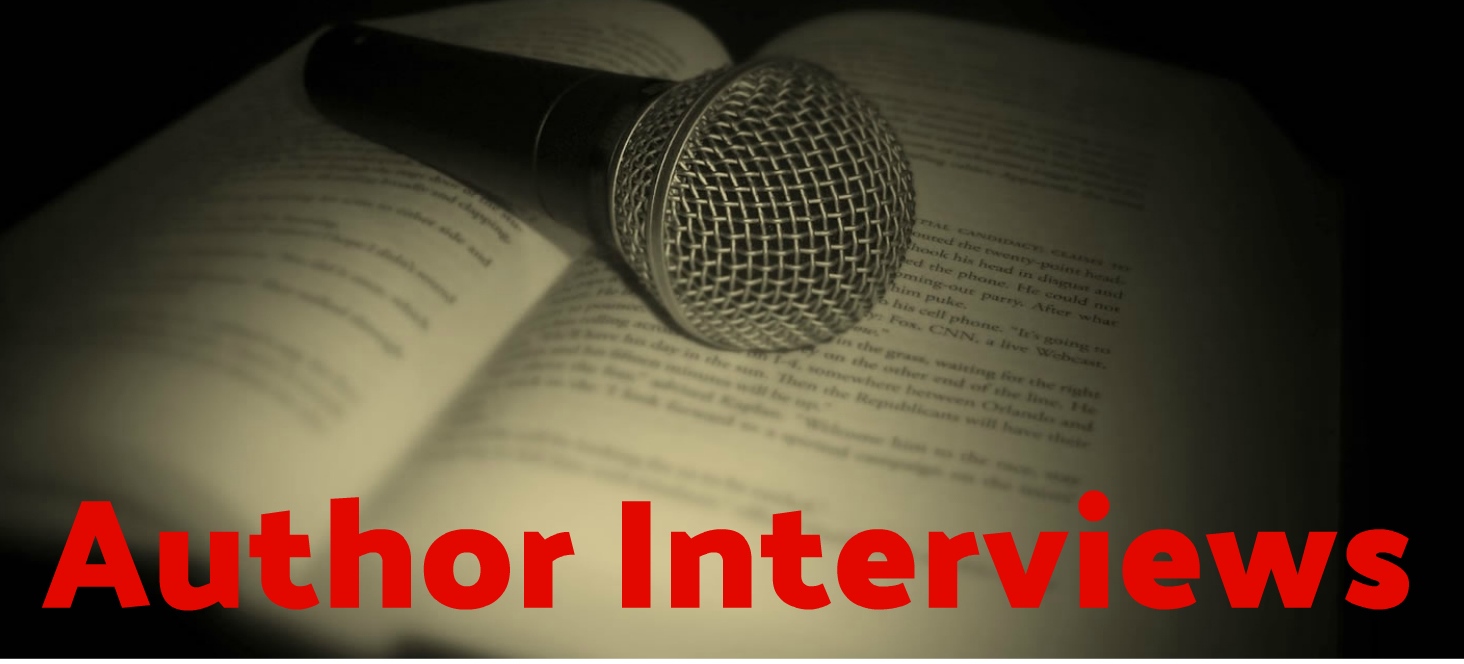
In-Depth Discussions with Today's Darkest Talents
Scott Nicholson Talks Hillbilly Horror & Tooth Decay
By, Vince A. Liaguno
Scott Nicholson has written about the creepy goings-on in haunted churches, rural farms, idyllic artist retreats, and even a wayward home for boys. He's the dark scribe with a penchant for Appalachian settings and a lighthearted affinity for themed author photos. He's raised an eyebrow or two with some randy killer goats and a macabre giveaway that would make even the most seasoned tooth fairy grimace. If he weren't ecletic enough, Nicholson is even known to jump onstage and strum a few chords on the bass guitar when the mood strikes him. Oh, yeah, and he's as unapologetic a book whore as they come.
Nicholson shoots straight from the hip and right between the eyes when he sat down for this rollicking interview with Dark Scribe Magazine:
 Dark Scribe Magazine: Tell readers about your latest release They Hunger (Pinnacle). What can they expect different in this novel from previous works?
Dark Scribe Magazine: Tell readers about your latest release They Hunger (Pinnacle). What can they expect different in this novel from previous works?
Scott Nicholson: A rawer, more visceral experience. Wilderness as threat, the inner human animal as threat. Much of my earlier work was more Gothic, with odd events slowly building around a single setting. While this one retains the Appalachian flavor, it’s gone into the woods, and there’s no real explanation or validation for the evil, if you can even call it “evil.”
Dark Scribe: In many of the reviews for They Hunger, mention is made that you bring back the old school vampire – the rip-a-hole-in-your-throat variety. Why have vampires gotten such a bad rap in recent years? Did you intentionally set out to restore vampire lore to its darker roots?
Scott Nicholson: I’m sure I violated some purist ideals along the way, but a culturally hip bisexual with angst doesn’t flip 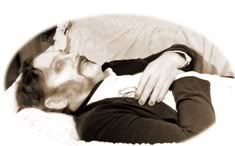 my switches, nor do soccer moms with wooden stakes and silver crosses. Not much about my creatures fits any standard lore. I knew the publisher was going to put fangs on the cover no matter what, so besides the sucking of blood (and other things), I could have called them anything—horny chupacabra, hillbilly devils, a twelve-step group for V-8 addicts. Originally I wanted them to have one huge fang that would rip your ass like a can opener, but I figured the wasted sustenance wouldn’t be a smooth biological adaptation for a supposedly ageless creature.
my switches, nor do soccer moms with wooden stakes and silver crosses. Not much about my creatures fits any standard lore. I knew the publisher was going to put fangs on the cover no matter what, so besides the sucking of blood (and other things), I could have called them anything—horny chupacabra, hillbilly devils, a twelve-step group for V-8 addicts. Originally I wanted them to have one huge fang that would rip your ass like a can opener, but I figured the wasted sustenance wouldn’t be a smooth biological adaptation for a supposedly ageless creature.
Dark Scribe: Your novels are all set in the Appalachian region. Why the fascination, and why do you think the Appalachian region translates so well to horror?
Scott Nicholson: I live here, and it’s easy to harvest local legends. I know the people, I love the folklore, and find an attractive streak of paranoia and suspicion runs through these hills—with good reason, considering white hillbillies and trailer trash are the last cultural group that it’s still socially acceptable to mock. And I proudly include myself in both camps, though I’m not completely white by any means. The folklore is a large part of the identity of the Southern  mountains, because the original white settlers were fleeing persecution of various sorts, bringing their strange tales and passing them around in relative isolation. And the natives already here certainly had mythology intimately tied to the landscape.
mountains, because the original white settlers were fleeing persecution of various sorts, bringing their strange tales and passing them around in relative isolation. And the natives already here certainly had mythology intimately tied to the landscape.
Dark Scribe: What do you say to the comparisons that you’re to Appalachian horror what Bentley Little is to the Southwest? Has carving out a geographical niche been an intentional step toward developing a thread of continuity throughout your catalog?
Scott Nicholson: Well, I’m the only writer of any genre really doing Appalachian thrillers. There are a few like William Gay, Manly Wade Wellman, and Mark Justice who might fall under the “hillbilly horror” label, but this is the best thing I have going for me. I’m not loud and I’m not sexy and I’m not all that smart. I 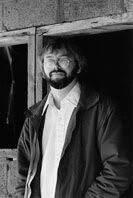 haven’t quite been able to develop the marketing niche to my satisfaction, but I have a strong regional readership. Bentley Little is great at locale, as are Dean Koontz, Elizabeth Massie, James Lee Burke, Joe Lansdale, Deborah LeBlanc, and Stephen King, among others. Many stories could be set in Anywhere USA but when the setting is an integral part of plot, theme, and character, the overall work is more powerful.
haven’t quite been able to develop the marketing niche to my satisfaction, but I have a strong regional readership. Bentley Little is great at locale, as are Dean Koontz, Elizabeth Massie, James Lee Burke, Joe Lansdale, Deborah LeBlanc, and Stephen King, among others. Many stories could be set in Anywhere USA but when the setting is an integral part of plot, theme, and character, the overall work is more powerful.
Dark Scribe: This seems to be a hot topic these days, so I’ve got to get your take on this: horror versus thriller. Would you say this is an inconsequential moniker preference or an integral marketing strategy in today’s market? Is there some sense that true horror authors who opt for the latter are somehow selling out?
Scott Nicholson: Hell, no. I never use the “horror” label. It’s cost me potential lovers and I have no doubt it’s cost me book sales. Bentley Little, whom I think of as a brilliant social satirist, loves the horror label. Stewart O’Nan, known mostly as a literary writer, has told me he’s proud to be called a horror writer. They sell well, but their books aren’t labeled “horror.” You can find an essay on my site called “The Last American Horror Writer,” about my experience during signings for The Farm and its being the only book I could find in the entire store that had “horror” on the spine. Pretty damned scary.
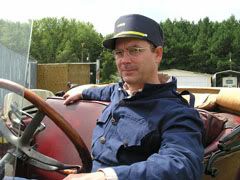 My agent and I have always call my books “thrillers.” They thrill more than horrify, and I find people drawn to “horror” are more likely to want gore and an emotionally raw experience. I have English professors come up to me and say I write really well. I’m sure some people think I have too much character development and attempts at thematic depth when all they want is a good brain munch or a quick boo. But I’m more interested in how human beings tick than in what their intestines look like.
My agent and I have always call my books “thrillers.” They thrill more than horrify, and I find people drawn to “horror” are more likely to want gore and an emotionally raw experience. I have English professors come up to me and say I write really well. I’m sure some people think I have too much character development and attempts at thematic depth when all they want is a good brain munch or a quick boo. But I’m more interested in how human beings tick than in what their intestines look like.
Especially distressing to me is the casualness with which gore and torture have slipped into mainstream media, particularly movies. Maybe it’s a response to the carnage on the news and the world is desensitized, and perhaps because I don’t have television and I avoid the news like the plague, it makes a more dramatic impact on me than it does others. Recently I watched Pan’s Labyrinth and Children of Men and in both cases I was stunned by the needless amount of cruelty. You can argue there’s a point to the violence, but you don’t have to show it, you can let it build in the audience’s mind. Frankly, I think it’s a copout. And I’m especially disturbed by the linking of violence and sex, or so-called “erotic horror” that’s little more than celebration of rape. Woo-hoo, what a turn-on! If that’s where horror is evolving, then fuck it. Call me a “thriller writer.” Or “asshole.” I don’t care. I don’t allow mindless cruelty and pain in my life.
Dark Scribe: Speaking of marketing, you did something (how do we say this delicately?) downright macabre recently to promote They Hunger: you gave away some of your own teeth! Where did that idea spring from, and aren’t you afraid of crazy fans running around town with Scott Nicholson’s DNA? Fess up...were they really your own teeth? If so, we must advise you…get thee to a dentist! Those are some nasty looking choppers, friend.
Scott Nicholson: Yes, they were really real and really mine. Given my previous response, maybe I look like a hypocrite, but it’s not like I yanked the teeth out fresh for the contest. I’d kept them around a number of years after surgery because I knew I’d do something freaky with them someday. I gave them away in a contest for people who helped promote the novel,  and the response ranged from “Yuck” to “I can’t wait to do voodoo on your ass.” Although the suggestion that someone might use my DNA to frame me for murder evoked the thought, “Hell, think of the great publicity! That’s almost as good as when the real church threatened to sue me over my novel The Red Church.
and the response ranged from “Yuck” to “I can’t wait to do voodoo on your ass.” Although the suggestion that someone might use my DNA to frame me for murder evoked the thought, “Hell, think of the great publicity! That’s almost as good as when the real church threatened to sue me over my novel The Red Church.
Dark Scribe: Six books in six years. That’s an impressive track record for a newer writer. Was that a timeline you set for yourself or a publisher’s demand? How did you discipline yourself to meet such a timeline?
Scott Nicholson: Never enough time, never enough books out. That doesn’t count the three movie scripts, the three unsold novels, and maybe 30 or 40 short stories. And I’m a reporter in my day job and also crank out writing articles when I have something to share that might help someone. I don’t have discipline, I have fear. A huge inferiority complex wrapped in an atmosphere of the most poisonous ego imaginable. Every night before I close my eyes, I look back on the day and meditate and go, “Who did I hurt, what could I have handled better, and what did I do to fulfill my goals?” I better have a good answer to all three or I don’t sleep. Even if it means to get out of bed and write.
Dark Scribe: Let’s talk reviews for a minute. What’s your own take – important or not? What’s the Nicholson method for dealing with bad reviews?
Scott Nicholson: Well, I’ve had both good and bad but I quit reading them after the first couple of books, after a few of those brilliant Amazon quips such as “This book was so bad I’d rather have bamboo slivers under my fingernails” and “This  sucked all the way to the end, and I read it twice to make sure,” no doubt written by self-published dickheads who didn’t read the book because they offered no insight at all. Besides, the book’s already finished. What are you supposed to do, go around and buy up every copy and revise it to the fit the tastes of somebody whose opinion matters not a bit? The same is true of those paint-by-numbers glowing reviews, you know, the guy gets 100 friends to give him five-star reviews—yeah, if it’s so fucking great, where’s the next Stephen King?
sucked all the way to the end, and I read it twice to make sure,” no doubt written by self-published dickheads who didn’t read the book because they offered no insight at all. Besides, the book’s already finished. What are you supposed to do, go around and buy up every copy and revise it to the fit the tastes of somebody whose opinion matters not a bit? The same is true of those paint-by-numbers glowing reviews, you know, the guy gets 100 friends to give him five-star reviews—yeah, if it’s so fucking great, where’s the next Stephen King?
The only reviews I’ll read are the significant ones that can have some affect within the industry, such as Publisher’s Weekly and New York Times Review of Books. I’ve never noticed any difference in sales 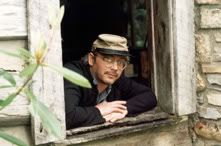 either way. That’s not to mean I don’t feel I have room for improvement—I’m by far my own worst critic and I think all the bad stuff long before anybody points it out and I’m afraid to reread anything I’ve ever published. Once it’s in the mail, it’s on to the next. My philosophy at this stage is “I don’t give a shit if you love me or hate me, just notice me.”
either way. That’s not to mean I don’t feel I have room for improvement—I’m by far my own worst critic and I think all the bad stuff long before anybody points it out and I’m afraid to reread anything I’ve ever published. Once it’s in the mail, it’s on to the next. My philosophy at this stage is “I don’t give a shit if you love me or hate me, just notice me.”
Dark Scribe: Best line from a review of any of your books…?
Scott Nicholson: Oh, probably for The Harvest, written by a New York City resident who said “This book breaks the record for Southern small-town clichés.” Those weren’t stereotypes. Those were based on my goddamned relatives—for real. But the Yankees won the war and know better than I do, so there you have it. HWA VP Nicholson with President Deborah LeBlanc
Scott Nicholson: There aren’t any pitfalls, no more than you’d find in the local writing group that meets at the library and won’t let you dare publish anything. If you get caught up in the personalities and the small-group psychology, you’re wasting precious energy, but if you listen and participate, you can really grow as both a writer and a person. The resources are there if you know how to use them and if you build contacts as friendships instead of leech sacs. Some of my most satisfying experiences in this so-called career have been working with like-minded professionals who have passion, honesty, and integrity—and, believe me, integrity is far from automatic in this business, especially given the egos running rampant. Maybe horror is the worst of the genres for that, or maybe it’s just horror writers are so desperate because the pie is so small and we’ve got to make our cockroach scuttle to the crumbs lest somebody else step on us first.

Dark Scribe: If you were asked to recommend one (and only one ) new dark scribe, a new writer who has debuted within the last 1-2 years, who would you single out as “the one to keep an eye on”?
Scott Nicholson: Whoa, that’s unfair. I’m going to make enemies I’ve never even heard of! To be honest, I’m not even sure I’ve read any writers that new, at least in long form. I do like what I’ve read of Joe Schreiber and Alex Sokoloff. I spend my time reading manuscripts, since I work as a freelance editor, and I kick back with Richard Brautigan, Mark Twain, Elmore Leonard, and whatever audiobooks I can get from the library. There’s no rhyme or reason or goal or must-reads. I’m culturally unhip and terribly out of date.
Dark Scribe: Why do you think horror as a genre is important?
Scott Nicholson: A writer friend of mine, Shane Montgomery, said it best: “Titillation will never go out of style.” Whether it’s the creeps or a good erotic rush (though preferably not both at the same time, unless that’s your bag or you’re a certain ex-ladyfriend of mine), we love the rush. And I think we generally prefer a safe rush, an experience over which we have some control. No doubt, few people want to have lunch with a cannibalistic serial killer, but millions of people love to look at Hannibal Lecter across the cinematic dinner table. When somebody slaps you in handcuffs, you trust them to have the key, not pull a Gerald’s Game or The Killer Inside Me. When you walk in a graveyard, chances are good you eventually want to walk out.
Dark Scribe: What writers line the bookshelves of Scott Nicholson, reader?
Scott Nicholson: Hmm, let me go look—I don’t have anything in any order so I’ll just grab a random slice. William Goldman’s Boys & Girls Together; Skipp & Spector’s The Light At The End; Forgotten Tales Of North Carolina, a collection of weirdities; Bentley Little’s The Burning; a cheesy David Bowie bio, We Could Be Heroes; Latitudes & Attitudes: An Atlas of American Tastes, Trends, Politics, and Passions; Lew Hunter’s Scripting 434; and Editors On Editing.
Dark Scribe: You maintain a blog in which you offer advice and guidance to aspiring writers. Why is it important for you to give back like that?
Scott Nicholson: Because it’s cool. Because we all walk in the footsteps of many storytellers dating back to the dawn of human awareness and we all stand on the shoulders of dreaming giants. And, if you can articulate what you think you’ve learned, then you learn more in the telling. That’s why I work as a freelance editor. Sure, I charge for it, but there’s joy in watching someone improve and in deepening an understanding of the craft. This is a lifetime gig, whether you ever sell a book or become a bestseller or not.
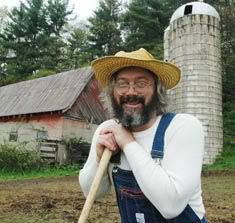
Dark Scribe: You take a fresh and fun approach to author photos, changing them up from title to title with a new author photo that corresponds to the subject matter of each particular novel. For The Farm, you donned overalls and a big straw hat and leaned against a pitchfork, while the author photo for They Hunger finds you reposing in a coffin, fangs visible. Are you merely a frustrated actor – or is this another visual marketing strategy? Your idea or the publisher’s?
Scott Nicholson: That’s the Bowie in me—adopt a character for a day. Most publishers of midlist writers don’t have the resources to promote your work, so you have to be creative. And, at the end of the day, there aren’t many get-rich-quick stories in this business, so you may as well enjoy yourself along the way. I love the responses I get, especially on MySpace. One guy wrote  and said, “Where’d you find that creepy farmer dude? That’s perfect!” I didn’t want to inform him that the farmer was me, very much the way I am in real life when I’m tending the goats or digging in my organic garden. And the photo of me as a fanged corpse drew so many responses from women of “Scott, that’s so hot!” that it made me wonder, “Gee, what’s so wrong with the real me?” (laughs) Ha. Fun stuff.
and said, “Where’d you find that creepy farmer dude? That’s perfect!” I didn’t want to inform him that the farmer was me, very much the way I am in real life when I’m tending the goats or digging in my organic garden. And the photo of me as a fanged corpse drew so many responses from women of “Scott, that’s so hot!” that it made me wonder, “Gee, what’s so wrong with the real me?” (laughs) Ha. Fun stuff.
Dark Scribe: Another hot topic amongst writers is the concept of writers and marketing. Some authors feel strongly that the writer’s job is to write, write, and then write some more. They take the approach that the work will speak for itself. Others feel that their involvement in the marketing and publicity machines is paramount to getting their titles into readers’ hands. Where do you lie on this spectrum of thought?
Scott Nicholson: Well, I’ve seen people both succeed and fail by taking either path, so I couldn’t say for sure what works. Given the energy I’ve put into promotion, I sometimes wonder if I’d have been better off focusing on writing in various fields. If you read the articles on my website, you’ll find me as a cheerleader for getting out the megaphone, particularly in underutilized media such as the local newspaper. Now I could write something, which is actually the title of a writing-advice book I’m working on, called Everything I Thought I Knew Was Wrong. There’s no easy answer, besides the publisher giving you a truckload of money right out of the gate and then having to scramble to recoup the investment, meaning they print a ton and ship a ton and promote a ton. Let’s be real. There are exceptions that are so rare as to be noteworthy (and, like awards, the “lottery winner” aspect is another great way that books get publicity long after they no longer need them), but bestsellers are made and not born. That’s why the bookstores get the bestseller lists weeks before the books are even released.
No need to get cynical about the death spiral of sales numbers and store orders and the emasculating might of the corporate computer, but a book’s fate has much more to do with what one salesperson tells another salesperson, with neither having read the book, than anything you can do with your roll of stamps and MySpace posts and freaky teeth giveaways. On the other hand, what else are you going to do? Sit around and bitch, or put forth whatever honest effort you can? Karma.
Dark Scribe: Just heard the great news that the film rights for one of your books has been optioned. What can you share with Dark Scribe readers to satisfy their voracious curiosity? Scott Nicholson: I've always had film people looking at things but it never clicked. I'd written a script for The Manor a few years back, and I met an actor online who was gearing up a new production company. We stayed in touch and then he optioned both the book and script, and is also finishing the paperwork on a script of mine called The Skull Ring adapted from an unpublished novel. I just mailed him another he wants to see, a non-horror, Coen-esque original. It might turn into another part-time job. Of course, all these are miles from the screen but that's why they call Hollywood "the land of dreams."
Scott Nicholson: I've always had film people looking at things but it never clicked. I'd written a script for The Manor a few years back, and I met an actor online who was gearing up a new production company. We stayed in touch and then he optioned both the book and script, and is also finishing the paperwork on a script of mine called The Skull Ring adapted from an unpublished novel. I just mailed him another he wants to see, a non-horror, Coen-esque original. It might turn into another part-time job. Of course, all these are miles from the screen but that's why they call Hollywood "the land of dreams."
Dark Scribe: Fantasy time: As part of your big Hollywood deal, you're named casting agent for the big screen adaptation of The Manor. Who's in...and in what roles?
Scott Nicholson: Wow, I don't keep up with the scene much so I can't really do that; I'd probably pick dead or ancient actors, based on my own viewing habits, and I'm terrible with remembering names. They were talking to Patrick Swayze about some projects, but at his age he could probably only work for the bad guy, Ephram Korban. Or maybe Michael Rooker for that. I like Amber Tamblin but Anna is kind of snotty so that might be a stretch. Mason could be played as a flawed hero, so pretty much pick any star old enough to shave who would fit the budget-- I'd love to see Giuseppe Andrews (Cabin Fever; 2001 Maniacs) in anything of mine. I've got a crush on Jodie Foster, but it dates back to The Little Girl Who Lives Down The Lane, so I probably wouldn't shoot anybody for her, but she could play a ghost. Obviously I'd make a lousy casting director, so I'm willing to trust whatever they do.
I don't have any fear of "Hollywood ruining my vision." I don't have a vision. Or, rather, I had a hundred of them. I don't give a damn if they turn it into an animated musical with songs by Elton John, as long as the check clears.
Dark Scribe: Please give us a “tease” for the next Scott Nicholson project. Or at least tell us what you’ll be wearing in the next author photo...
Scott Nicholson: Well, I have a couple of straight thrillers, a Civil War zombie novel, some scripts and books out in Hollywood, and I’m doing two projects under pen names that will remain secret until there’s a reason to do otherwise. It’s all part of expanding and tricking the computers. And trying something new. People see “Scott Nicholson” and “The The” books, but my reality in my life is that I am writing all over the map—funny stuff, chick lit, children’s books, songs, scripts, magazine articles, dark literary realism, fantasy, pretentious metafiction, even the odd bit of poetry. So I don’t know how the roulette wheel will turn out, but if it’s the chick lit under a pen name, maybe you’ll see me in drag. Not sure whether I’d shave the hillbilly beard. And even less sure about the legs. But, as they say, anything to whore a goddamned book.
For more about Scott Nicholson, visit his official author website and MySpace page.



